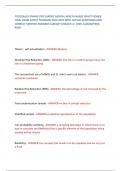FITZGERALD PMHNP PSYCHIATRIC MENTAL HEALTH NURSE PRACTITIONER
FINAL EXAM LATEST TESTBANK 2024-2025 WITH ACTUAL QUESTIONS AND
CORRECT VERIFIED ANSWERS ALREADY GRADED A+ 100% GUARANTEED
PASS!
Theory - self-actualization - ANSWER-Maslow
Absolute Risk Reduction (ARR) - ANSWER-The risk in a control group minus the
risk in a treatment group
The concomitant use of MAOIs and St. John's wort can lead to - ANSWER-
serotonin syndrome
Relative Risk Reduction (RRR) - ANSWER-The percentage of risk removed by the
treatment
True randomization sample - ANSWER-no bias in sample selection
Stratified sample - ANSWER-a selective reproduction of the population
non-probability sampling - ANSWER-a sampling technique in which there is no
way to calculate the likelihood that a specific element of the population being
studied will be chosen
Reliability - ANSWER-the concept that results can be repeated and are not just
a fluke
,Validity - ANSWER-The results indicate what the researcher thinks they indicate
Internal validity - ANSWER-includes research design and steps of the scientific
method
External validity - ANSWER-includes assessment of the interference's or causal
relationship
Retrospective study - ANSWER-existing data are analyzed, either qualitatively
or quantitatively
Veracity - ANSWER-The healthcare provider must be truthful and avoid
deception
LACE Essentials - ANSWER-Licensure
Accreditation
Certification
Education
Licensure - ANSWER-granting of authority to practice
Primary prevention - ANSWER--preventing the health problem
-most cost-effective form of healthcare
-immunizations
Secondary prevention - ANSWER--detecting the disease
-screening
,Tertiary prevention - ANSWER--minimizing negative disease induced outcomes
-disease already present
-adjust therapy to avoid further damage
Conditions that originate during brain development - ANSWER--schizophrenia,
depression, autism, ADHD
The Reptilian Brain - ANSWER-Brainstem and Cerebellum
Brainstem Structure - ANSWER-Pons, medulla oblongata, midbrain
Brainstem Function - ANSWER--Regulates blood pressure, respiration, level of
arousal, and digestion
-Information relay to cerebellum
Brainstem effects of damage - ANSWER-impaired inhibition, anxiety,
depression, and personality changes
Brainstem specific psychiatric conditions - ANSWER-PTSD, paralysis, psychosis,
coma, and death
Cerebellum function - ANSWER-coordinates balance, posture, movement,
memory, impulse control, cognition, language
Cerebellum effects of damage - ANSWER-damage can cause ataxia, tremors,
emotional blunting, and lack of inhibition
, cerebellum specific psychiatric conditions - ANSWER-autism and ADHD,
depression, bipolar do, schizophrenia
The emotional brain - ANSWER-The Limbic System
The Limbic system major structures - ANSWER-Amygdala, Hippocampus
Amygdala key functions - ANSWER-Regulates basic, powerful emotions: fear,
rage, sexual desire
Amygdala effects of damage - ANSWER-Irritability, anger, aggression
Amygdala specific psychiatric conditions - ANSWER-PTSD, panic do, depression,
autism, and schizophrenia
Hippocampus key functions - ANSWER-Involved in memory and converting
short-term memory into long-term memory, learning
Hippocampus effects of damage - ANSWER-Impaired memory and attention
Hippocampus specific psychiatric conditions - ANSWER-PTSD, Alzheimer's,
dementia, and major depression
Thalamus key functions - ANSWER--relay station that connects the cortex to the
limbic system for sensory information
-Influences affect, mood, and body movements associated with strong emotion




